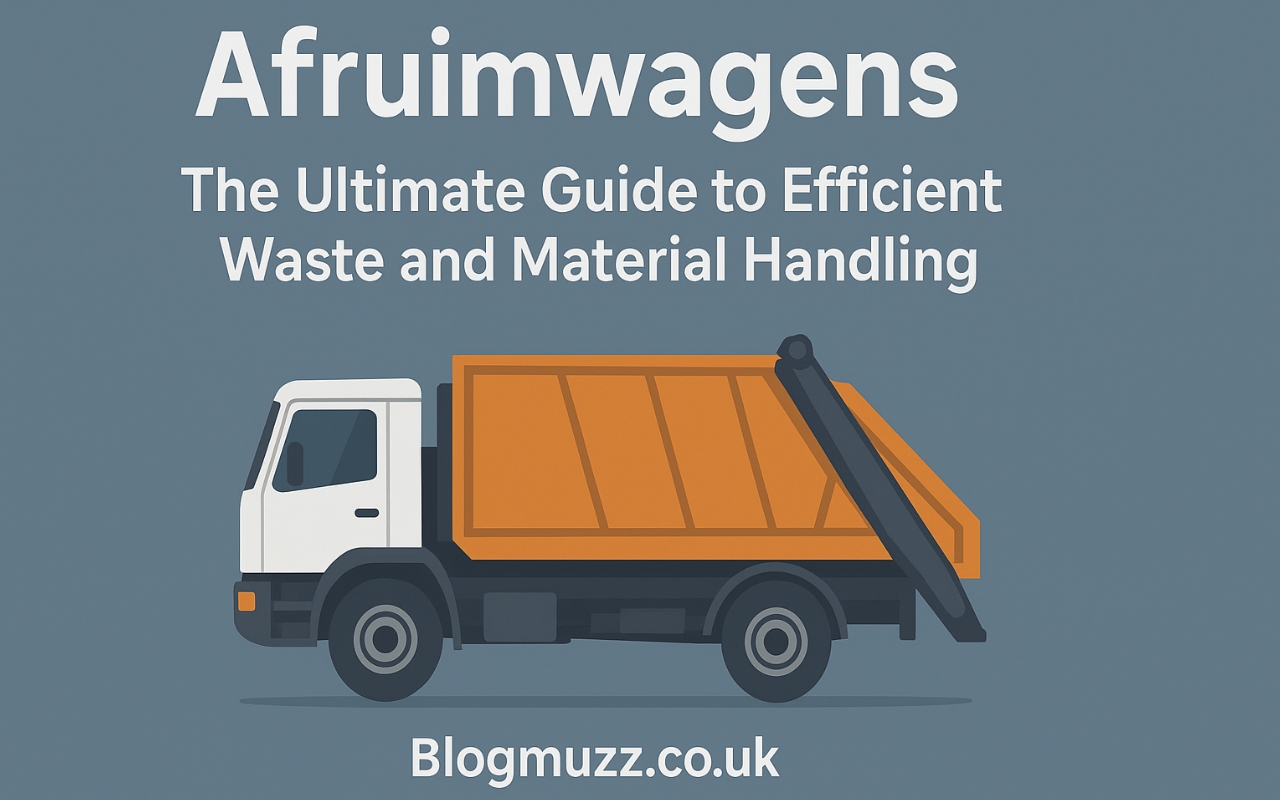In today’s fast-paced industrial and agricultural environments, efficiency and sustainability are key to success. One piece of equipment that plays a surprisingly critical role in both sectors is the afruimwagen—a specialized vehicle designed for waste removal, material handling, and transport. Whether you’re managing a farm, a construction site, or a manufacturing facility, afruimwagens can make operations smoother, safer, and more productive.
In this detailed guide, we’ll explore everything you need to know about afruimwagens—what they are, how they work, the different types available, their benefits, maintenance tips, and how to choose the right one for your needs.
What Are Afruimwagens?
The word “afruimwagen” originates from Dutch and literally translates to “clean-up wagon” or “clearing wagon.” In simple terms, an afruimwagen is a type of transport or collection vehicle used to remove waste, debris, agricultural by-products, or bulk materials from one location to another.
Afruimwagens come in many shapes and sizes, from small tractor-pulled trailers to large mechanized dumpers and industrial-grade transporters. They are commonly seen on farms, construction sites, recycling plants, and warehouses.
In agriculture, for example, afruimwagens are used for collecting and transporting harvested crops, animal feed, silage, or manure. In industrial settings, they handle everything from packaging waste to heavy materials that need relocation.
The Evolution of Afruimwagens in Modern Industry
Afruimwagens have come a long way from their humble beginnings. Originally, farmers and factory workers relied on simple handcarts or horse-drawn wagons to carry waste and materials. Over time, as technology advanced, the demand for more efficient and durable equipment led to the development of mechanized afruimwagens.
Today’s models are engineered for efficiency, safety, and sustainability. Many are built with hydraulic systems, automated dumping mechanisms, and heavy-duty chassis that can handle tons of load effortlessly. Some high-end versions even come with GPS tracking, electric motors, and IoT-based monitoring systems to ensure optimal performance and reduced downtime.
This evolution has made afruimwagens indispensable to operations where time and productivity are crucial.
Different Types of Afruimwagens
Not all afruimwagens are created equal. Depending on your industry, material type, and workload, you can choose from various types designed for specific applications. Below are the most common categories:
1. Agricultural Afruimwagens
These are the most widely used type. They’re typically attached to tractors and used for tasks such as collecting silage, hay, manure, or crop residues. Most agricultural afruimwagens come with high-capacity bins and hydraulic lift systems for easy unloading.
2. Industrial Afruimwagens
In industrial environments, afruimwagens are used to move waste, scrap, and raw materials across manufacturing plants. They’re often built with reinforced steel to withstand high-impact loads.
3. Construction Afruimwagens
On construction sites, these wagons transport sand, gravel, cement, or demolition waste. Many models have tipping functions or conveyor attachments that allow for rapid unloading.
4. Electric and Automated Afruimwagens
The latest innovation in this sector includes electric-powered afruimwagens that run on rechargeable batteries. They’re eco-friendly and ideal for use in indoor or environmentally sensitive areas.
5. Custom-Built Afruimwagens
Some manufacturers offer customized designs tailored to specific requirements—like compact models for small farms or heavy-duty versions for mining operations.
Each type offers unique features, and the choice depends largely on how and where you plan to use it.
Key Features and Components of Modern Afruimwagens
Modern afruimwagens are built with precision engineering and advanced components to ensure long-term durability and performance. Here are the core features that make them so effective:
1. Robust Frame and Chassis
The foundation of any afruimwagen is its sturdy frame. Made from high-grade steel or aluminum, it provides the structural integrity required for heavy loads and rough terrain.
2. Hydraulic Systems
Hydraulics allow for smooth lifting, tilting, and dumping of materials. This automation reduces manual labor and increases efficiency.
3. High-Capacity Containers
Depending on the model, afruimwagens can hold anywhere from a few hundred liters to several tons of material. Some are even equipped with adjustable side panels or loading ramps.
4. Mobility and Tires
Equipped with strong, wide tires, these wagons can traverse muddy fields, gravel paths, or uneven factory floors without tipping over.
5. Safety Features
Modern afruimwagens come with braking systems, LED lighting, and stability sensors to ensure the operator’s safety during use.
Benefits of Using Afruimwagens
The benefits of using afruimwagens go far beyond simple material transportation. They contribute to efficiency, cost savings, safety, and sustainability—making them a smart investment across multiple industries.
1. Increased Productivity
By automating the loading and unloading process, afruimwagens drastically reduce the time it takes to handle materials. Workers can focus on more productive tasks instead of manual labor.
2. Cost Efficiency
Although an initial investment is required, afruimwagens save money in the long run by lowering labor costs, fuel expenses, and equipment downtime.
3. Versatility
From agriculture to construction, these wagons can handle a variety of materials—organic, recyclable, or industrial.
4. Environmental Sustainability
Electric afruimwagens and models designed for waste segregation support eco-friendly operations by reducing carbon emissions and improving recycling efficiency.
5. Enhanced Safety
Manual handling of heavy materials can lead to injuries. Afruimwagens reduce human contact with hazardous or bulky items, ensuring a safer working environment.
How to Choose the Right Afruimwagen
Selecting the right afruimwagen depends on several factors, including your operational needs, budget, and terrain type. Here’s a guide to help you make an informed decision:
- Assess Your Load Type and Volume: Determine whether you’re moving lightweight materials or heavy debris. This affects capacity and design choices.
- Consider Your Environment: Farms, factories, and construction sites all have different surface and space requirements.
- Check Durability: Look for corrosion-resistant materials, strong welds, and sturdy tires.
- Evaluate Automation Options: Hydraulic lifts, automatic dumpers, or electric drives may be worth the upgrade for efficiency.
- Set a Realistic Budget: While it’s tempting to go for high-end models, choose a wagon that fits your long-term financial plan.
A well-chosen afruimwagen can last for years and deliver excellent returns through productivity and reliability.
Maintenance Tips for Afruimwagens
Just like any mechanical equipment, afruimwagens require regular care to maintain performance. Neglecting maintenance can lead to breakdowns, costly repairs, and downtime.
- Inspect Hydraulic Systems: Regularly check for leaks and maintain oil levels.
- Clean the Container: Prevent buildup of waste or corrosive materials that can damage the metal.
- Lubricate Moving Parts: Reduce friction and wear on mechanical joints.
- Check Tires and Axles: Ensure proper inflation and alignment for stability.
- Store Properly: When not in use, store in a dry, sheltered area to avoid rusting.
Routine maintenance extends the life of your afruimwagen and ensures it operates safely and efficiently.
Top Afruimwagen Brands and Manufacturers
Several companies across Europe and beyond specialize in the design and production of high-quality afruimwagens. Some of the most recognized names include:
- Beco Group – Known for heavy-duty agricultural afruimwagens.
- Kipperworks – Offers customized industrial and construction models.
- Joskin – A leader in multifunctional farming trailers and afruimwagens.
- Veenhuis Machines – Famous for manure handling and transport wagons.
- Schuitemaker – Specializes in innovative, durable transport solutions for farmers.
Choosing a reputable brand ensures better performance, easier access to spare parts, and reliable after-sales service.
Future Trends in Afruimwagen Technology
The future of afruimwagens looks bright as technology continues to evolve. Here are a few innovations shaping the next generation of these vehicles:
- Electric and Hybrid Powertrains: Reducing fossil fuel dependence and emissions.
- Smart Sensors and IoT Integration: Real-time monitoring of load capacity, maintenance needs, and GPS tracking.
- Automation and AI: Self-driving afruimwagens for large-scale farms and factories.
- Sustainable Materials: Lightweight, recyclable components to minimize environmental impact.
These advancements will make afruimwagens not only more efficient but also more environmentally responsible in the coming years.
Conclusion: Why Afruimwagens Are a Smart Investment
To sum up, afruimwagens are far more than just waste carriers—they are integral tools for modern efficiency and sustainability. From managing agricultural residues to handling industrial materials, these machines make everyday operations faster, cleaner, and safer.
With the right model, regular maintenance, and smart usage, an afruimwagen can transform how you manage your logistics and waste processes. As industries move toward automation and eco-friendly practices, investing in a high-quality afruimwagen is both a practical and forward-thinking choice.



